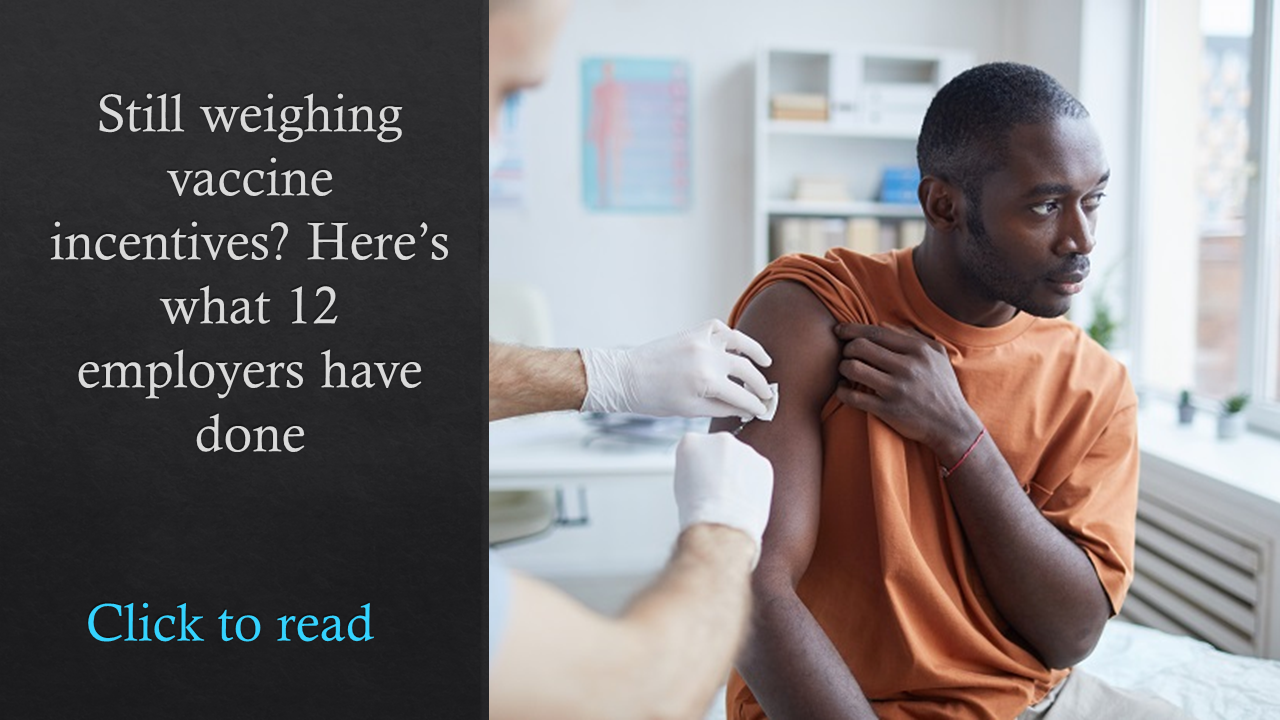Employers can officially offer their workers incentives for getting vaccinated against COVID-19, the Equal Employment Opportunity Commission said Friday, guidance that will likely spur more companies to turn to rewards to boost vaccination rates.

Many companies have already been offering enticements for their workers to receive the vaccine, such as paid time off, cash and gift cards. But others were reluctant to do so because of legal uncertainties, with many company and HR leaders concerned that incentives may put them at risk of violating state and federal statutes. The new EEOC guidance “resolves a lot of guessing,” says employment lawyer Jessica Summers, a principal at Paley Rothman in Bethesda, Md. “Now companies and states can continue on the road to reopening and help more workers to become vaccinated.”
In the guidance, the EEOC says employers may offer incentives to employees to voluntarily receive a vaccine, whether employees receive the vaccine on their own from a pharmacy, health department or community health partner, or whether employees receive a vaccine administered by the employer or an agent of the employer, “as long as the incentives are not coercive,” the EEOC said in a news release Friday.
Read all of HRE’s COVID-19 vaccine stories here.
“This is good news,” says employment lawyer Scott Mirsky. “Businesses have been waiting for the EEOC to weigh in on this. There is now clarity that if an employee receives their vaccine from a third party–someone other than the employer–then the employer is generally permitted to provide the employee with an incentive. Many of our clients are offering gift cards to employees who receive the vaccine. Now we know that this is permissible.”
Related: Still weighing vaccine incentives? Here’s what 12 employers have done
One important point for HR is that the EEOC’s guidance reinforces that employees belonging to some demographic groups may encounter more barriers to receiving vaccinations than their co-workers, says Carol Morrison, senior research analyst at the Institute for Corporate Productivity (i4cp). “Keeping that in mind can help HR ensure that organizational vaccination requirements don’t unfairly impose hardships or negative fallout for any members of their workforces,” she said.
Another important standout from the guidance is the affirmation that employers may provide educational information to workers and their families to raise awareness of vaccines and the benefits of vaccinations, Morrison says.
Related: As universities mandate vaccines, will more employers join them?
Importantly, the new guidance will likely spur employers to add incentives for getting vaccinated, especially as rates of vaccination stall.
“Since we’ve reached an inflection point with vaccinations in general in the U.S., that broader use of incentives will be one of the reactions to decreasing vaccination rates,” Morrison says. “By directly addressing incentive use, the EEOC is validating the practice, so greater use by employers seems a likely result.” She notes that i4cp research confirms that many companies are offering incentives such as paid time off, facilitating easier access to vaccinations, cash or gift cards, and more. “The data also consistently shows organizational leaders are constantly thinking about broader incentive use,” she says.

Although the EEOC said in December that employers can require that employees get vaccinated as a condition of going to work–with some accommodation requests–most organizations have said they will not require workers to get vaccinated, but instead, encourage them to do so.
Incentives, though, may be especially impactful. A survey from Blackhawk Network, a payments provider, finds that although some 40% of workers are either unsure about getting the vaccine or do not plan to get it, certain incentives could boost vaccination rates. For as little as $100, one-third of employees would agree to get vaccinated against COVID-19, the survey of 1,105 employees finds.
A handful of employers have already relied on incentives: Kroger, which has nearly 500,000 workers, said it will offer employees who get the vaccine a one-time payment of $100, Petco is giving workers who get vaccinated $75, and Aon is offering all of its some 50,000 employees two days of paid time off for each injection.
 Employers are widely seen as essential in encouraging employees to get inoculated and boost vaccination numbers across the country. Surveys find that many Americans are reluctant to get vaccinated against COVID-19, despite the fact that it is the only way out of the pandemic, but research finds employees can be swayed by trusted sources, like their employer.
Employers are widely seen as essential in encouraging employees to get inoculated and boost vaccination numbers across the country. Surveys find that many Americans are reluctant to get vaccinated against COVID-19, despite the fact that it is the only way out of the pandemic, but research finds employees can be swayed by trusted sources, like their employer.
That’s especially important to consider as many companies mull a return to the workplace and need to make that happen safely. “It’s pretty clear that there is no scenario for most companies where employees are returning unvaccinated to the office in 2021,” Justin Holland, CEO and founder of HealthJoy, a benefits company that works with some 700 employers, told HRE recently. “This is a conversation that HR leaders need to be having with their people now.”

